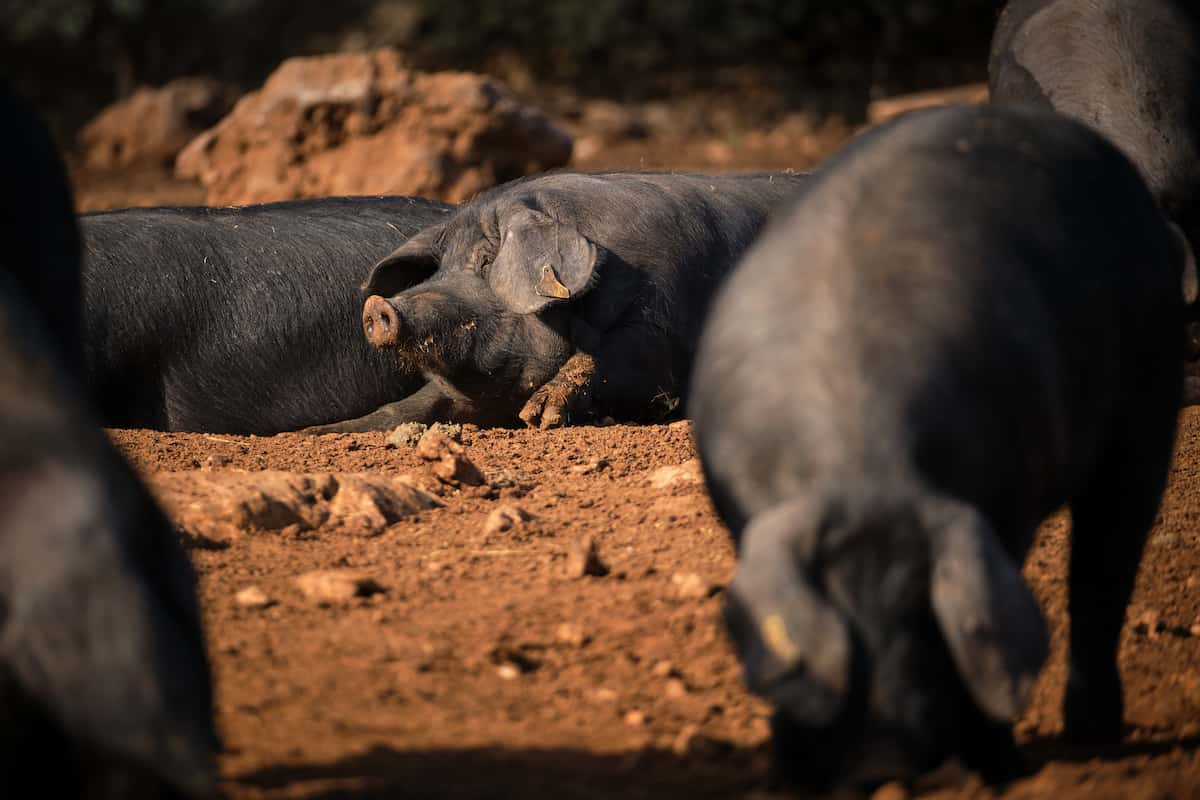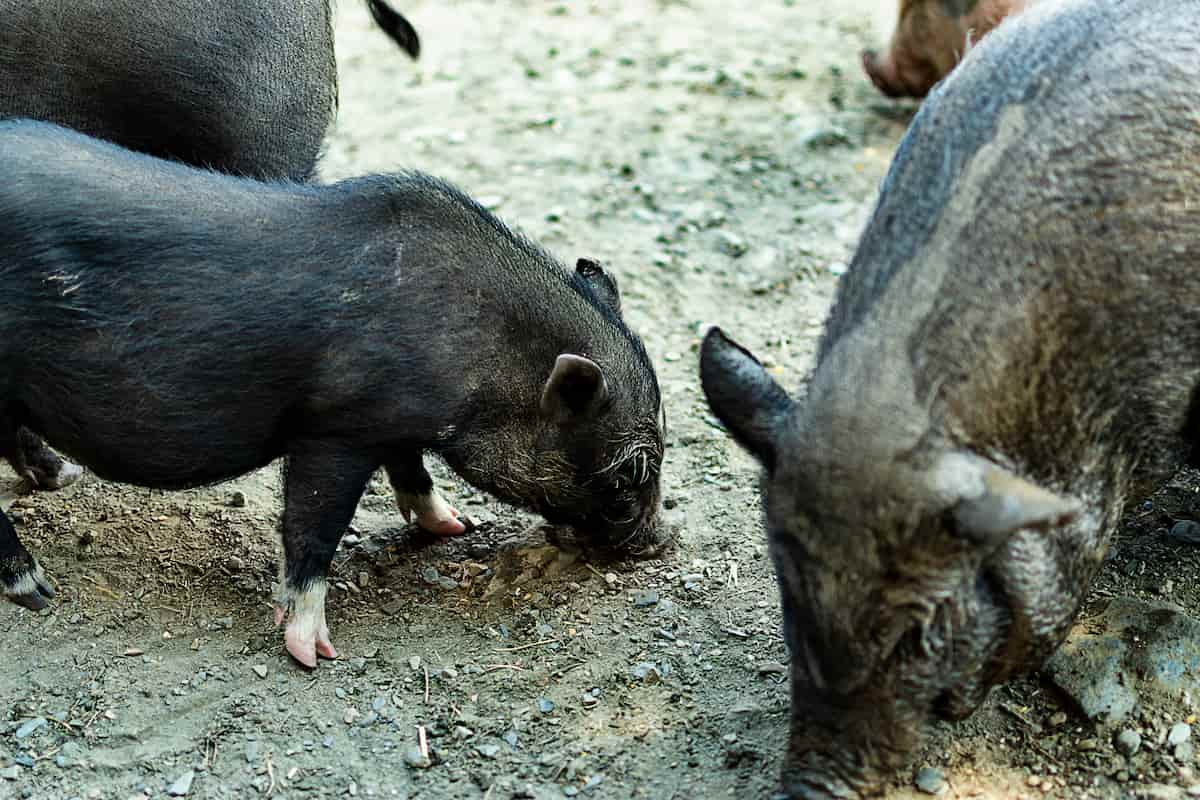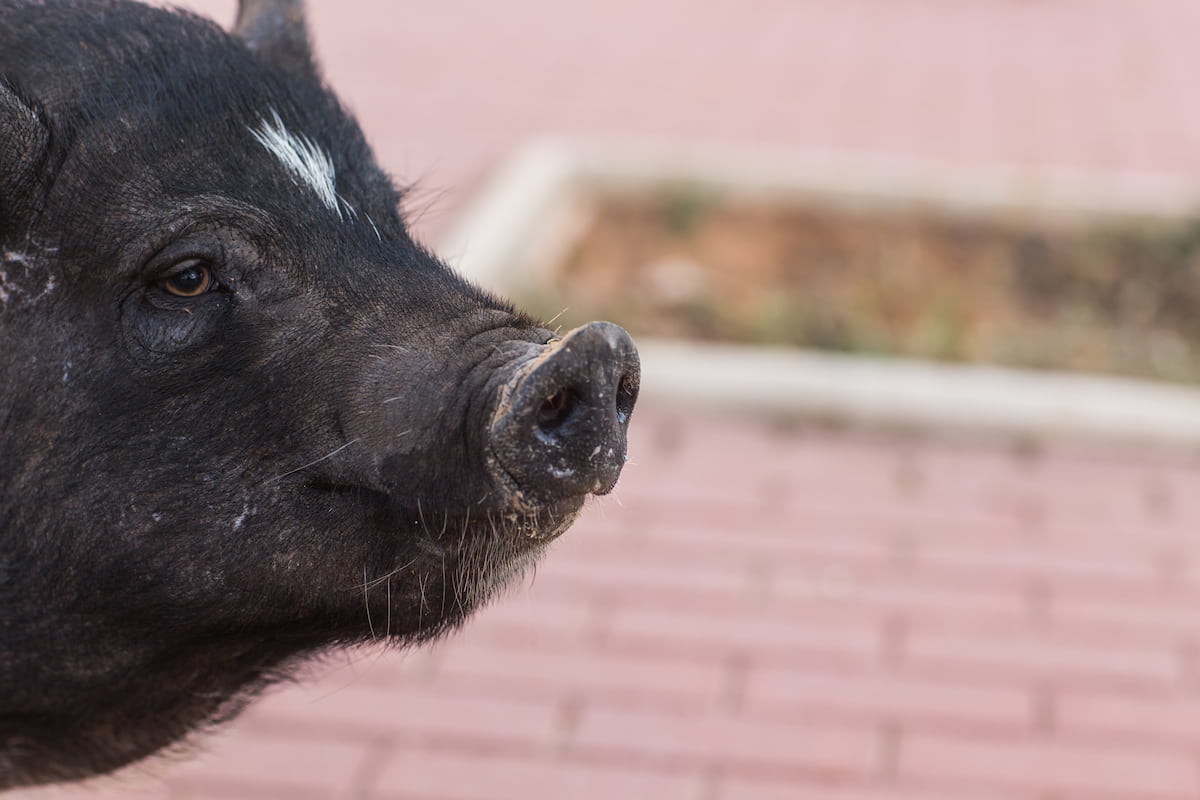A rare breed of pig is known for producing quality meat, known as the Berkshire pig. They are heritage pigs, usually large breeds famous for their exceptional meat. Their ruggedness and intelligence make them well-suited for pasture life. Berkshire pigs are excellent for extensive piggery farming systems. In addition, they are also good in confinement. Consequently, they are ideal for small-scale production and backyard farms.

Berkshire Pig Facts
Where Does the Berkshire Pig Originate, and What Is Its History?
- The Berkshire pig originates from Berkshire, a county in the United Kingdom. In England, they are one of the oldest breeds of pigs.
- This breed of pig is mainly reared to produce high-quality, flavorful meat.
- Before World War II, Berkshire pigs were a popular breed of pig. In the 19th century, the British generally enjoyed them, including the Queen.
- Pig breeds like these were even larger and coarser than today’s Berkshires.
- Their colors ranged from black to sandy red.
- After World War II, the demand for pork meat became industrialized, which led to a decline in Berkshire pig populations and popularity.
Physical Characteristics of Berkshire Pigs
- The Berkshire pig has a stout and short body and is a big to medium-sized breed.
- Berkshire stocky looks have a long, fat-rich body structure, smooth, tender muscles, and a long body structure. Their measurements include a height of 65-95cm and a length of 37-65cm.
- There are usually white patches on Berkshire pigs’ legs, noses, and tails.
- There were different colors of Berkshire pigs, from sandy brown to black.
- As they mature, their jaws grow larger, and they have moderately small heads
- Due to their marbling, their bodies are meat-rich with fat, making them look plump and juicy.
- The outer ear of a Berkshire pig is called a pinna, and it points upwards.
- Boars and sows with mature body weights of 280 kg and 220 kg are considered mature.
- This is a good weight size in piggeries, and they can weigh even more than this.
- There are a lot of snouts on Berkshires, and they are also very sensitive.
- They have white spots, which is a unique feature of this breed.
- Like other pigs and omnivores, they have incisors in front, canines, premolars, and molars, which are well-adapted to chewing.
- A tusk is an elongated set of teeth that extends from an animal’s mouth. Each breed of pig has a tusk, but the size varies depending on gender. The female Berkshire has a much smaller tusk than the male
- Berkshires have cloven hooves, as do other pigs. Weight distribution is adjusted, and balance is improved on uneven terrain.
- Unlike other pig breeds, Berkshire pigs have short curly tails. Their tails have a patch of white color, even though they are black. It is useful for driving away buzzing flies.
- Giving birth to pigs is called farrowing. When Berkshire pigs farrow between 111 – 115 days after service, the sow may show signs such as loss of appetite and restlessness. A well-cared-for and well-fed sow will produce at least ten piglets in a litter and may have two litters yearly.
In case you missed it: Feed Management in Pig Farming: Feeding Plan, Feed Formula, and Feed Requirements

Advantages of Berkshire Pig Farming Over Other Farming
The Berkshire Pig is One of The Most Intelligent Breeds of Pigs
In terms of domestic animals, pigs are among the smartest. Intelligent and friendly, they are credited to be even smarter than dogs. Berkshire pigs are quick learners due to their ability to focus better than dogs and their non-aggressive nature.
They Make Good Companion Animals Because They Are Docile And Friendly
The breed is known for yielding to instructions and being easily trainable. Berkshire pigs are interactive and obedient when they are in a good environment.
It is A Pretty Good Pet to Have A Berkshire Pig
Their behavior is like a baby’s, and they are lovely to have around. In addition to being attentive to their environment, humans, and other animals, pigs are also sensitive to them. Generally, they form good bonds with owners, understand emotions, feelings, and instructions, and enjoy physical interaction.
In Addition to Eating Anything Edible, Berkshire Pigs Are Excellent Foragers
Plants and meat are both eaten by pigs, making them omnivores. It eats corn, oats, wheat, garbage, waste, fungi, hay, vegetables, fruits, carcasses, and grasses.
Meat From Berkshire Pigs is Tasty And Delicious
It produces pink, tender, flavorful, and richly fatted pork meat of the highest quality. This has resulted in a huge demand for Berkshire pork.
They are Social Animals and Emotionally Sensitive
Berkshire pigs exhibit many social behaviors, including cooperative, selfish, hurtful, and helpful behaviors. Thus, they can become emotional, hold grudges, become moody, happy, sad, and even throw tantrums.
Berkshire Pigs Have Great Mothering Skills
The mother pigs of Berkshires are very protective of their young and may attack you if you get in their way. After birth, they nurse their piglets for about six weeks.
They are Clean Animal
Contrary to popular belief, pigs are not dirty animals who love dirty places and mud. Since they don’t sweat, they look for cool spots to cool down and play in mud pools. Like other pigs, Berkshire pigs are some of the cleanest animals.
Disadvantages of Rearing Berkshire Pigs
- Berkshire pigs can sometimes be stubborn and aggressive, a downside of being emotional. Destructive behavior could also indicate depression, stress, or playfulness in young pigs.
- It is a rare breed of pig bred by only a few farms with their targeted consumers already. Berkshire pigs are rare breeds that are difficult to find.
- Pigs, especially the Berkshire pig breed, require a lot of space to keep and rear. The animals enjoy roaming freely and grazing freely in a free-range environment.
- Disease and sickness are common among Berkshire pigs. Pigs are not picky eaters, so they can ingest harmful and infectious substances if they feed on anything. Pigs can suffer mild and serious health problems from eating contaminated food.
In case you missed it: Benefits of Pig Manure Fertilizer in Agriculture: Uses, When and How to Apply

Conclusion
Berkshire pigs are heritage breeds that produce high-quality meat. They make good pets due to their lively and intelligent displays, but their size sometimes discourages people from getting them as pets. If well-fed and cared for, these breeds provide good results and responses. To keep them healthy, clean, and happy, always keep their environment neat and cool, and provide them with good feed.
- Ultimate Guide to Ossabaw Island Hog: Breeding, Raising, Diet, and Care
- Ultimate Guide to Juliana Pig: Raising Facts, Size, Diet, Care, and Lifespan
- Raising Lleyn Sheep: Disadvantages, Price, Uses, Characteristics, and Care
- Ultimate Guide to Meishan Pig: Breed Facts, Breeding, Raising, and Care
- Ultimate Guide to Teacup Pigs: Raising, Diet, Lifespan, Cost, and Care
- Guide to Raising Poll Dorset Sheep: Facts, Profile, Characteristics, Uses, and Care
- Ultimate Guide to Bighorn Sheep: Characteristics, Diet, Lifespan, Breeding, and Lifecycle
- Ultimate Guide to Raising Katahdin Sheep: Farming Facts, Breed Profile, Uses, and Care
- Ultimate Guide to Raising Oreo Cows: Belted Galloways Farming Facts, Profile, Uses, and Care